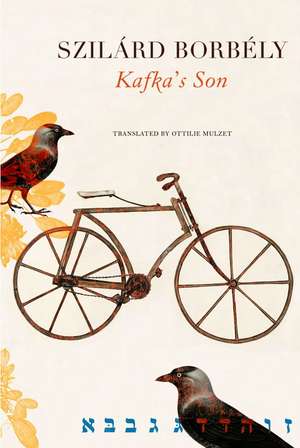Kafka’s Son: The Hungarian List
Autor Szilárd Borbély Traducere de Ottilie Mulzeten Limba Engleză Hardback – 21 dec 2023
Born in 1963, Szilárd Borbély emerged as one of the most important poets of post-communist Europe, exploring the themes of grief, memory, and trauma in his critically acclaimed work. Following the murder of his mother during a burglary in 2000, and the subsequent breakdown and death of his father, Borbély suffered from post-traumatic depression and tragically ended his own life in 2014.
Among the manuscripts that Borbély left behind was Kafka’s Son, a fragmentary work, rendered still more fragmented through the author’s death. Through a series of haunting passages that explore early twentieth-century Prague, including the ruins of the ancient Jewish ghetto during the time of its demolition, Borbély inscribes the story of Franz Kafka and his father onto the city. We are used to hearing from Franz; here Hermann Kafka is also given a voice. “The son,” he tells us, “is the life of the father. The father is the death of the son.” By extension, then, this book is also an indirect telling of the story of Borbély and his father, and about sons and fathers in the Habsburg empire and the culture of brutality that defined Eastern Europe.
A posthumously published Hungarian masterpiece, Kafka’s Son now appears in English in award-winning translator Ottilie Mulzet’s sensitive translation, a fragmentary yet iridescent work inviting us to reflect on our fragmented lives.
Preț: 137.55 lei
Nou
Puncte Express: 206
Preț estimativ în valută:
26.32€ • 28.58$ • 22.11£
26.32€ • 28.58$ • 22.11£
Carte disponibilă
Livrare economică 02-16 aprilie
Livrare express 18-22 martie pentru 45.67 lei
Preluare comenzi: 021 569.72.76
Specificații
ISBN-13: 9781803092683
ISBN-10: 1803092688
Pagini: 184
Ilustrații: 1 map
Dimensiuni: 152 x 229 x 20 mm
Greutate: 0.42 kg
Editura: Seagull Books
Colecția Seagull Books
Seria The Hungarian List
ISBN-10: 1803092688
Pagini: 184
Ilustrații: 1 map
Dimensiuni: 152 x 229 x 20 mm
Greutate: 0.42 kg
Editura: Seagull Books
Colecția Seagull Books
Seria The Hungarian List
Notă biografică
Szilárd Borbély was an authority on Hungarian literature of the late Baroque period as well as a writer and was widely considered to be one of the most important European poets of the post-Communist period. Ottilie Mulzet was awarded the National Book Award for Translated Literature for her translation of László Krasznahorkai’s Baron Wenckheim’s Homecoming in 2019.
Cuprins
To the Reader
From the Notes of Hermann
Kafka and the Streets
Kafka and My Twin
Kafka in the Bathroom
An Evening Stroll
Kafka and the Words
Kafka at the Rabbi’s
Kafka Writes
Kafka and the Letters
Journey to Leitmeritz
My Dear Son
Kafka by the Window
Felice and the Applause
Photograph Taken with a Flash
The Cemetery of Language
Kafka and the Blind
The Enigma of the Sphinx
Tiny Flowers on a Calico Dress
Kafka and Palestine
My Dear Son
Lichtgasse
A Gloomy Day
The Silence of Nebuchadnezzar
Memory of a Nearness
Kafka and the Colours
The Married Couple, Snow
Kafka’s Fortieth Birthday
Kafka and the Bicycle
The Naked Hand
Kafka on the Bridge
Conversation at the Table
The Fart
The Case
My Dear Son
The Civil Servant
My Dear Son
Translator’s Afterword
From the Notes of Hermann
Kafka and the Streets
Kafka and My Twin
Kafka in the Bathroom
An Evening Stroll
Kafka and the Words
Kafka at the Rabbi’s
Kafka Writes
Kafka and the Letters
Journey to Leitmeritz
My Dear Son
Kafka by the Window
Felice and the Applause
Photograph Taken with a Flash
The Cemetery of Language
Kafka and the Blind
The Enigma of the Sphinx
Tiny Flowers on a Calico Dress
Kafka and Palestine
My Dear Son
Lichtgasse
A Gloomy Day
The Silence of Nebuchadnezzar
Memory of a Nearness
Kafka and the Colours
The Married Couple, Snow
Kafka’s Fortieth Birthday
Kafka and the Bicycle
The Naked Hand
Kafka on the Bridge
Conversation at the Table
The Fart
The Case
My Dear Son
The Civil Servant
My Dear Son
Translator’s Afterword
Recenzii
"Kafka’s tortured relationship with his father is well known to the author’s readers, but Borbély adds to the lore by exploring the limits of how much anyone can understand another, whether a father and son, or a reader and writer, as Mulzet suggests in an illuminating afterword about Borbély’s long-held identification with Kafka. Kafka fans will enjoy this."









